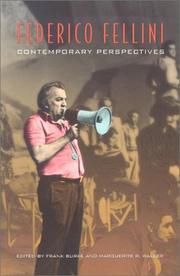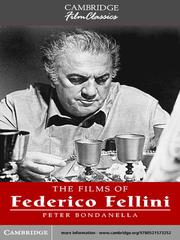| Listing 1 - 10 of 17 | << page >> |
Sort by
|
Book
ISBN: 9781845114251 1845114256 Year: 2007 Publisher: London Tauris
Abstract | Keywords | Export | Availability | Bookmark
 Loading...
Loading...Choose an application
- Reference Manager
- EndNote
- RefWorks (Direct export to RefWorks)
film --- Italië --- Fellini Federico --- twintigste eeuw --- 791.471 FELLINI --- Motion picture producers and directors --- Fellini, Federico.

ISBN: 0195022742 0195022734 9780195022735 9780195022742 Year: 1978 Publisher: Oxford Oxford University Press
Abstract | Keywords | Export | Availability | Bookmark
 Loading...
Loading...Choose an application
- Reference Manager
- EndNote
- RefWorks (Direct export to RefWorks)
film --- twintigste eeuw --- Italië --- Fellini Federico --- 791.471 FELLINI --- Fellini, Federico. --- Fellini, Frederico --- Fellini, F. --- Felini, Federiḳo --- פליני, פדריקו --- Fellas, --- Fellini, Federico
Multi
ISBN: 9780857459718 0857459716 9780857459701 0857459708 9781782382300 1782382305 9781782382317 1782382313 Year: 2013 Publisher: New York : Berghahn Books,
Abstract | Keywords | Export | Availability | Bookmark
 Loading...
Loading...Choose an application
- Reference Manager
- EndNote
- RefWorks (Direct export to RefWorks)
Federico Fellini's script for perhaps the most famous unmade film in Italian cinema, The Journey of G. Mastorna (1965/6), is published here for the first time in full English translation. It offers the reader a remarkable insight into Fellini's creative process and his fascination with human mortality and the great mystery of death. Written in collaboration with Dino Buzzati, Brunello Rondi, and Bernardino Zapponi, the project was ultimately abandoned for a number of reasons, including Fellini's near death, although it continued to inhabit his creative imagination and the landscape
Art --- Motion pictures, Italian. --- Fellini, Federico --- Criticism and interpretation.
Book
ISBN: 2867440920 9782867440922 Year: 1987 Volume: 1 Publisher: Paris: POL,
Abstract | Keywords | Export | Availability | Bookmark
 Loading...
Loading...Choose an application
- Reference Manager
- EndNote
- RefWorks (Direct export to RefWorks)

ISBN: 0802076475 0802006965 9786612003172 1282003178 1442674830 9781442674837 9781282003170 9780802006967 9780802076472 Year: 2002 Publisher: Toronto, [Ontario] ; Buffalo, [New York] ; London, [England] : University of Toronto Press,
Abstract | Keywords | Export | Availability | Bookmark
 Loading...
Loading...Choose an application
- Reference Manager
- EndNote
- RefWorks (Direct export to RefWorks)
Federico Fellini remains the best known of the postwar Italian directors. This collection of essays brings Fellini criticism up to date, employing a range of recent critical filters, including semiotic, psychoanalytical, feminist and deconstructionist. Accordingly, a number of important themes arise - the reception of fascism, the crisis of the subject, the question of agency, homo-eroticism, feminism, and constructions of gender. Since the early 1970s, a slide in critical and theoretical attention to Fellini's work has corresponded with an assumption that his films are self-indulgent and lacking in political value. This volume moves the discussion towards a politics of signification, contending that Fellini's evolving self-reflexivity is not mere solipsism but rather a critique of both aesthetics and signification. The essays presented here are almost all new - the two exceptions being important signifiers in Fellini studies. The first, Frank Burke's "Federico Fellini: Reality/Representation/Signification" laid the foundation in the late 1980s for considering Fellini's work in the light of postmodernism. The second, Marguerite Waller's "Whose Dolce Vita is this Anyway?: The Language of Fellini's Cinema" (1990), provides a contemporary re-reading of Fellini's most successful film. This lively and ambitious collection brings a new critical language to bear on Fellini's films, offering fresh insights into their underlying issues and meaning. In bringing Fellini criticism up to date, it will have a significant impact on film studies, reclaiming this important director for a contemporary audience
Multi
ISBN: 9781782388203 1782388206 Year: 2015 Publisher: New York ; Oxford, [England] : Berghahn,
Abstract | Keywords | Export | Availability | Bookmark
 Loading...
Loading...Choose an application
- Reference Manager
- EndNote
- RefWorks (Direct export to RefWorks)
Federico Fellini is often considered a disengaged filmmaker, interested in self-referential dreams and grotesquerie rather than contemporary politics. This book challenges that myth by examining the filmmaker’s reception in Italy, and by exploring his films in the context of significant political debates. By conceiving Fellini’s cinema as an individual expression of the nation’s “mythical biography,” the director’s most celebrated themes and images — a nostalgia for childhood, unattainable female figures, fantasy, the circus, carnival — become symbols of Italy’s traumatic modernity and perpetual adolescence.
Art --- Fellini, Federico --- Political and social views. --- Italy --- In motion pictures.
Book
ISBN: 2747547108 Year: 2003 Publisher: Paris : Editions L'Harmattan,
Abstract | Keywords | Export | Availability | Bookmark
 Loading...
Loading...Choose an application
- Reference Manager
- EndNote
- RefWorks (Direct export to RefWorks)

ISBN: 1107113571 1280417072 0511175957 1139145754 0511065728 0511059418 0511323549 0511613342 0511067852 9780511065729 9780511059414 9780511067853 9786610417070 6610417075 0521573254 9780521573252 0521575737 9780521575737 9780511613340 0511090269 9781107113572 9781280417078 9780511175954 9781139145756 9780511323546 Year: 2002 Publisher: Cambridge Cambridge University Press
Abstract | Keywords | Export | Availability | Bookmark
 Loading...
Loading...Choose an application
- Reference Manager
- EndNote
- RefWorks (Direct export to RefWorks)
The Films of Federico Fellini examines the career of one of Italy's most renowned filmmakers through close analysis of five masterpieces that span his career: La Strada, La Dolce Vita, 8 1/2, Amarcord and Interview. Providing an overview of Fellini's early career as a cartoonist and scriptwriter for neorealist directors such as Roberto Rossellini, this study traces the development of Fellini's unique and personal cinematic vision as it transcends Italian neorealism. Rejecting an overtly ideological approach to Fellini's cinema, Bondanella emphasizes the director's interest in fantasy, the irrational and individualism.
Motion pictures --- Motion picture industry --- Biography --- Employees --- Fellini, Federico --- Fellini, Frederico --- Fellini, F. --- Felini, Federiḳo --- פליני, פדריקו --- Fellas, --- Criticism and interpretation.
Book
ISBN: 2207243184 9782207243183 Year: 1995 Publisher: Paris: Denoël,
Abstract | Keywords | Export | Availability | Bookmark
 Loading...
Loading...Choose an application
- Reference Manager
- EndNote
- RefWorks (Direct export to RefWorks)
Motion picture producers and directors --- Producteurs et réalisateurs de cinéma --- Interviews --- Entretiens --- Fellini, Federico --- Producteurs et réalisateurs de cinéma --- Interviews. --- Producteurs et réalisateurs de cinéma - Italie - Entretiens --- filmgeschiedenis --- filmtheorie --- twintigste eeuw --- Italië --- Fellini Federico --- filmregisseurs --- 791.471 FELLINI --- CPP --- Fellini, Frederico --- Fellini, F. --- Felini, Federiḳo --- פליני, פדריקו --- Fellas,
Book
ISBN: 9029395923 Year: 1984 Publisher: Weesp Wereldvenster
Abstract | Keywords | Export | Availability | Bookmark
 Loading...
Loading...Choose an application
- Reference Manager
- EndNote
- RefWorks (Direct export to RefWorks)
Film --- Motion pictures. --- André Bazin --- film --- filmtheorie --- fotografie --- film en theater --- film en schilderkunst --- neorealisme --- Italië --- de Sica Vittorio --- Umberto D. --- Fellini Federico --- Le notte di Cabiria --- Rossellini Roberto --- 791.41 --- 798.2 --- film, inleiding, hand- en leerboeken --- Umberto D
| Listing 1 - 10 of 17 | << page >> |
Sort by
|

 Search
Search Feedback
Feedback About UniCat
About UniCat  Help
Help News
News